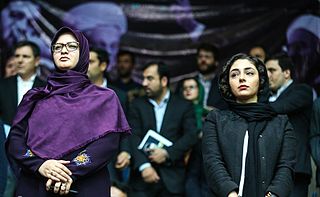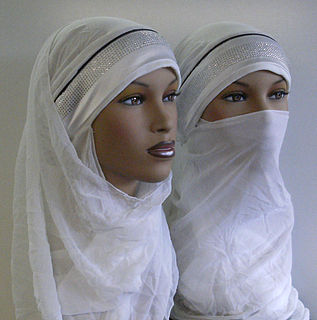
In modern usage, hijab refers to headcoverings worn by Muslim women. While Islamic headcoverings can come in many forms, hijab often specifically refers to a cloth wrapped around the head and neck, covering the hair but leaving the face visible.

A burqa or a burka, also known as a chadaree in Afghanistan or a paranja in Central Asia, is an enveloping outer garment which covers the body and the face that is worn by women in some Islamic traditions. The Arab version of the burqa is called the boshiya, and it is usually black.
Frederick John Nile, ED is an Australian politician and ordained Christian minister. Nile has been a member of the New South Wales Legislative Council since 1981, except for a period in 2004 when he resigned to unsuccessfully contest the Australian Senate at the 2004 federal election. Nile was re-elected at the March 2007 state election and served the Assistant President of the Legislative Council until 25 February 2019. He is the longest-serving member of the New South Wales Parliament. In November 2009, he stated his decision to retire in 2015, but later announced his decision to accept the Christian Democratic Party (CDP) nomination for the NSW Legislative Council at the New South Wales State Election on 28 March 2015.

Islamic clothing is clothing that is interpreted as being in accordance with the teachings of Islam. Muslims wear a wide variety of clothing, which is influenced not only by religious considerations, but also practical, cultural, social, and political factors. In modern times, some Muslims have adopted clothing based on Western traditions, while others wear modern forms of traditional Muslim dress, which over the centuries has typically included long, flowing garments. Besides its practical advantages in the climate of the Middle East, loose-fitting clothing is also generally regarded as conforming to Islamic teachings, which stipulate that body areas which are sexual in nature must be hidden from public view. Traditional dress for Muslim men has typically covered at least the head and the area between the waist and the knees, while traditional women's dress conceals the hair and the body from the ankles to the neck. Some Muslim women also cover their face. Islamic dress is influenced by two scriptural sources, the Quran and hadith. The Quran provides guiding principles believed to have come from God, while the body of hadith describes a human role model through the traditions of the Islamic prophet Muhammad. The branch of fashion industry influenced by Islamic principles is known as Islamic fashion.

A niqāb or niqaab, also called a ruband, is a garment that covers the face, worn by many Muslim women as a part of an interpretation of hijab. The terms niqab and burqa are often confused; a niqab covers the face while leaving the eyes uncovered, while a burqa covers the entire body from the top of the head to the ground, with only a mesh screen allowing the wearer to see in front of her. According to the majority of Muslim scholars and Islamic schools of thought, face veiling is not a requirement of Islam. Those Muslim women who wear the niqab, do so in places where they may encounter non-mahram (un-related) men.

Philip Thomas Hollobone is a British Conservative Party politician and former investment banker. He has been the Member of Parliament for Kettering since the 2005 general election.

Cory Bernardi is an Australian conservative political commentator and former politician. He was a Senator for South Australia from 2006 to 2020, and was the leader of the Australian Conservatives, a minor political party he founded in 2017 but disbanded in 2019. He is a former member of the Liberal Party of Australia, having represented the party in the Senate from 2006 to 2017. Bernardi is a committed conservative Catholic Christian and author of The Conservative Revolution.

The British debate over veils began in October 2006 when the MP and government minister Jack Straw wrote in his local newspaper, the Lancashire Evening Telegraph, that, while he did not want to be "prescriptive", he preferred talking to women who did not wear a niqab as he could see their face, and asked women who were wearing such items to remove them when they spoke to him, making clear that they could decline his request and that a female member of staff was in the room.
Hijab and burka controversies in Europe revolve around the variety of headdresses worn by Muslim women, which have become prominent symbols of the presence of Islam in especially Western Europe. In several countries, the adherence to hijab has led to political controversies and proposals for a legal partial or full ban in some or all circumstances. Some countries already have laws banning the wearing of masks in public, which can be applied to veils that conceal the face. Other countries are debating similar legislation, or have more limited prohibitions. Some of them apply only to face-covering clothing such as the burqa, boushiya, or niqab; some apply to any clothing with an Islamic religious symbolism such as the khimar, a type of headscarf. The issue has different names in different countries, and "the veil" or hijab may be used as general terms for the debate, representing more than just the veil itself, or the concept of modesty embodied in hijab.

A burkini is a style of swimsuit for women. The suit covers the whole body except the face, the hands and the feet, while being light enough for swimming. The amount of skin covered is about the same as the person wearing a wetsuit and a swimming cap.

The word hijab refers to both the head-covering traditionally worn by many Muslim women and to the concept of modesty in Islam generally. Afghanistan and Iran are the only countries where the hijab is compulsory.

The French ban on face covering is an act of parliament passed by the Senate of France on 14 September 2010, resulting in the ban on the wearing of face-covering headgear, including masks, helmets, balaclavas, niqābs and other veils covering the face in public places, except under specified circumstances. This ban does not apply to the hijab, as it does not cover the face. The ban also applies to the burqa, a full-body covering, if it covers the face. Consequently, full body costumes and Zentais were banned. The bill had previously been passed by the National Assembly of France on 13 July 2010. In April 2011, France became the first European country to impose a ban on full-face veils in public areas.

In a predominantly Muslim society, as many as 90% of women in Egypt have adopted a form of veiling. A majority of Egyptian women cover at least their hair with the hijab. A hijab refers to a head covering that is worn by Muslim women. Although the phenomenon of wearing the niqāb, a veil which covers the face is not as common, the niqab in Egypt has become more prevalent. While a few women in Egypt wear a black niqab along with a billowing black abaya as seen in countries such as Saudi Arabia, many choose to wear different colors of the niqab or manipulate the hijab to cover their face. Regardless, the growing trend of munaqqabat, or women who wear the niqab, has alarmed the authorities. They have begun to see this dress as a security threat, because it hides the face, and because it is perceived as a political statement, a rejection of the state in favor of a strict Islamic system.

Sergio Redegalli is an Australian glass artist specialising in glass sculptures. He is an owner of the Cydonia Glass Studio located in Newtown, New South Wales. Redegalli graduated from Sydney College of the Arts with a Bachelor of Arts Glass in 1984 and a Graduate Diploma – Glass Visual Arts in 1988. Whilst attending college, Redegalli has claimed, he was the subject of victimisation at the hands of "man hating lesbians". His glass sculpture Cascade was commissioned for the World Expo in Brisbane in 1988. This massive 12 ton sculpture in the shape of a cascading wave is on display in Adelaide Botanic Garden, Adelaide. He is currently the President of the Chamber of Commerce, at Tocumwal in the Riverina region of New South Wales.

Jacquiline Louise Lambie is an Australian politician who is the leader and founder of the Jacqui Lambie Network (JLN). She was a Senator for Tasmania from 2014 to 2017, and was re-elected in 2019.
Anti-mask or anti-masking laws are legislative or penal initiatives prohibiting the concealment of one's face in public. Anti-mask laws vary widely between jurisdictions in their intent, scope, and penalties.
Muslim Women's National Network Australia (MWNNA) is an association in Australia which represents a network of progressive Muslim women's organisations and individual Muslim women. MWNNA runs events and projects for Muslim women, and represents their views to media and government organisations.

Hijabophobia is a type of religious and cultural discrimination against Muslim women who wear the hijab. The discrimination has had manifestations in public, working and educational places.
Islamic feminist views on dress codes include feminist views on the issues surrounding women's dress codes in the Islamic religion.

The burqa is worn by women in various countries. Some countries have banned it in government offices, schools, or in public places and streets.














